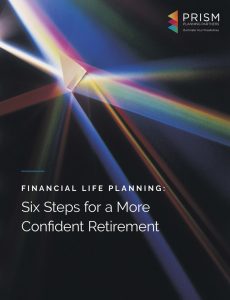Financial advice in Libertyville, IL abounds, on websites, television, social media, and more. While much of the financial advice purveyed may be helpful and sound, the sheer amount of it has also given rise to financial disinformation – myths, if you will. Myths are things that many people believe, but that don’t hold water on close analysis.
Are you on the right financial path? Contact Prism Planning Partners today for a consultation!
Even more seriously, myths can hurt you financially.
Here are five top myths ripe for busting:
1. Carrying a credit card balance will improve your credit score
This myth likely arises from a misunderstanding of what factors contribute to a good credit score. Companies that assess your credit score look at certain categories. One of them is credit utilization. Credit utilization is the amount of credit you are actually using out of what’s available to you.
If you have $15,000 theoretically available via credit cards and are only using a small amount, it will help your credit score, because your credit utilization is low. Conversely, if you are maxed out on all your cards, it lowers your credit score, because your credit utilization is high.
In other words, a low balance on a credit card will likely mean a better credit score than a high balance. But you can have a 0 balance on a credit card and get a good credit utilization score – there’s no need to carry a balance to benefit. Plus, oftentimes, credit card debt carries a very high-interest rate – 16 percent or more. Paying high charges like that likely isn’t a prudent use of your money.
The #1 factor in a good credit score is paying your bills on time. If you must use credit cards, keep the balance low – but you don’t need to carry a balance at all to have a good credit score.
2. I don’t need a budget
The grounds for this myth may be the connotation of the word “budget.” Some people associate budgeting with scrimping and choosing less expensive options for purchases.
Financial advisors, though, use the word “budget” differently. A budget is the record of your income versus your expenditures. You should consider keeping a record of both to make sure your expenses don’t exceed your income, and to know how much disposable income you have.
A budget is a vital component of any comprehensive financial plan. In fact, it’s not unlike a cash flow statement in business – it lets you know whether or not you’re in the red for a given month and how much is available for other things.
Some people who are comfortably well off may especially feel they don’t need a budget because their income is fine. But frankly, any income bracket can be overspending what they have, or have no idea where their money is going. A budget provides clarity and lets you plan for life goals because you know what you’re spending every month.
3. I don’t need an emergency fund
Financial planners often recommend an emergency fund of three to six months’ worth of income or more. Why? Because emergencies can happen even in the most well-planned lives. The COVID-19 pandemic is/was a vivid reminder of how sudden emergencies can upend our lives and arise totally out of our control. Many people lost jobs as industries downsized; college students moved home; children stopped physically going to school; lives changed.
What if your car needed a major repair? A surprising number of people in the United States couldn’t afford $400 for such an event. Some people who are laid up by illness may have to cut back on work or take a different job, which could affect their earnings. A job loss could impact your income and a job-seeker could spend several months trying to find a new one.
Emergencies big and small can be covered by an emergency fund.
4. I can wait to save for retirement
This is an enduring myth, especially among younger people. When you’re 25, socking away money for the golden years may seem pointless – or like it’s not a good use of the money.
But one of the main powers of retirement savings in a 401(k) plan or Individual Retirement Account (IRA) is their ability to grow over time. If you can put $5,000 this year in a retirement fund and it grows 6 percent annually (a very reasonable assumption if it’s invested in the stock market), you’ll end up with roughly $28,715 just from the one-time investment of $5,000 after 40 years. If you can swing it every year, you may have a robust sum for your retirement.
But if you invest $5,000 and only have five years to see it grow, the amounts may be much less substantial. Time is literally on your side in retirement savings.
Plus, the funds in traditional 401(k)s and IRAs grow tax-free until you withdraw them at retirement.
Sure, you probably have 40 years until retirement. But the later you start saving, the less you’ll actually have to live off of and thus may be forced to stay in the workforce longer than you hoped.
5. Buying a home is always better than renting
Well, this does have grains of truth in it. Homebuyers do have some financial advantages over renters, in several ways. They gain the benefit of tax deductions for mortgage interest (up to certain levels) and for property tax if they pay property tax. They gain the benefit of equity in a home. Renters lack both these advantages.
But the kicker here is the word “always.” The fact is, you have to assess your circumstances when making a buying versus renting decision. If home prices are dropping, you may lose equity, not gain it. If you may move to a different area in a year or two (or less), it may not benefit you to buy – and you likely won’t recoup the closing costs.
Here are some circumstances where renting might be better than buying, at least for a period of time.
- Home prices are overheated in your area and may drop in the future
- Home prices are definitely dropping
- You may move from the area (or be transferred) in the short term
- You’re in a period of transition, such as divorce or bereavement, and need time to consider your options
- You need to save for a down payment
Undo myths by working with a financial planner who can help coach you to your best life. Contact us today.
At Prism Planning Partners, we are CERTIFIED FINANCIAL PLANNER™️ Professionals committed to facilitating important questions so that we can help you explore all of your opportunities. We offer a broad array of financial planning and consulting services for our clients-including retirement, investment, and estate planning.
Contact us today and let us illuminate your possibilities!
 Download our free guide today!
Download our free guide today!



